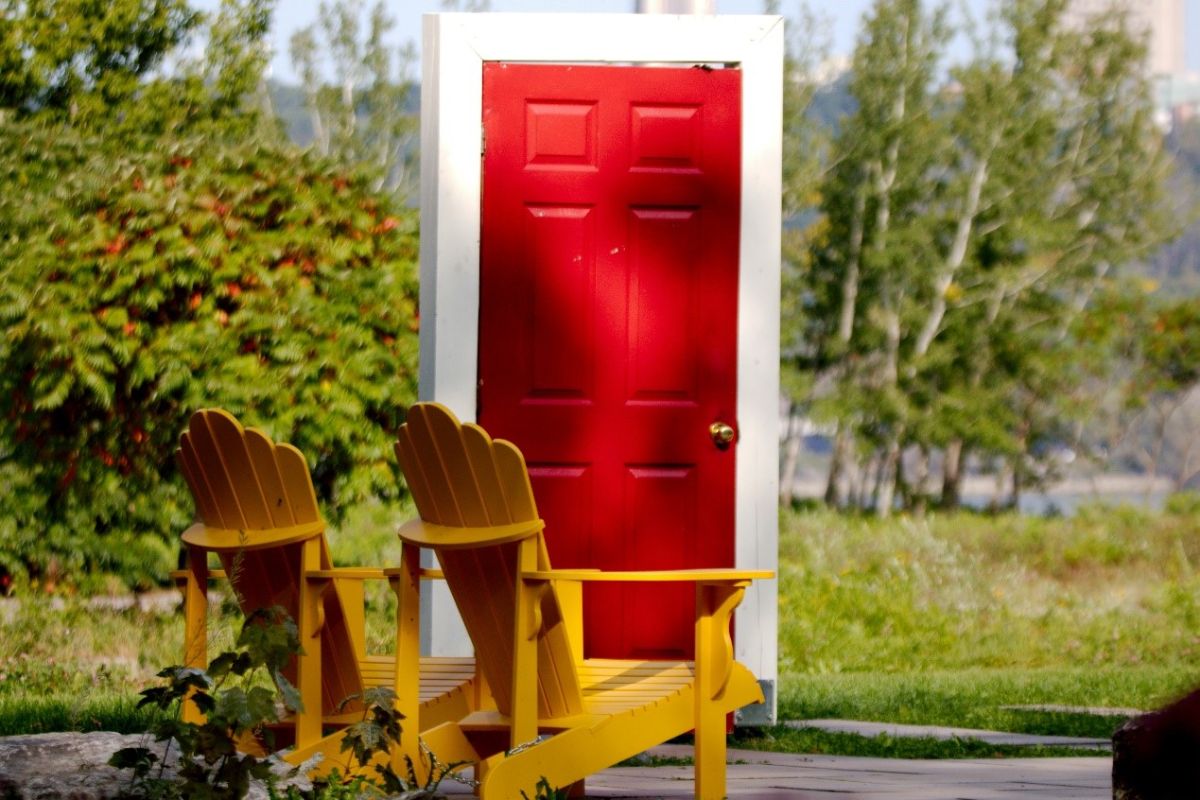人際關係
- 更新日期:113-10-29
- 發布單位:健康心理中心
The Door of Friendship
Here are 3 key points for fostering cross-cultural relationship.
By Ming-Chun Ko(Iris)|Full-Time Counseling Psychologist at Mental Health and Counseling Center
"I find it hard to make friends with Taiwanese students..."
"When I talk to Taiwanese students, it feels like they avoid eye contact. Am I being disliked?"
Perhaps you've experienced situations where you try to strike up a conversation but feel like you're being avoided. In this scenario, how would you describe yourself, a door, and Taiwanese students? Photo by Phil on Unsplash
Photo by Phil on Unsplash
Interpersonal Boundaries
Have you ever watched the movie The Chronicles of Narnia? The protagonists accidentally discover a wardrobe door that leads to a different world, embarking on a magical journey.
Interacting with people is like having a door, where you get to decide who can come in and how. Some folks have the password or key to the door, so they can come and go as they please. Others might need to knock, and you only let them in after you've made sure it's really them. Or maybe your door is never locked, and anyone can just walk in whenever they want.
Everyone Has a Unique Door
Think about your door - what does it look like? When do you open it and when do you close it? Doors vary in shapes and materials, such as wood grain, smooth iron, or transparent glass. Some doors are massive, like ancient city gates, while others are small, like the entrance to an igloo. Each door is unique, with different shapes, handles, or peepholes. Some may have mailboxes, torii gates, or sensors.
When you summon the bravery to open the door and invite someone in or graciously prepare refreshments, only to be politely declined, you might feel awkward, embarrassed, or disappointed. However, some Taiwanese students don't shy away from friendship but need courage to overcome language barriers. Some are reserved and may feel timid around people from different countries or cultures. How can we establish a bridge of friendship?
The Functions of a Door: Respect, Kindness, Inclusion
Respect
Respecting each other's boundaries is essential, along with enthusiasm and kindness. Building relationship safety and intimacy takes time. A 2018 study by researchers at the University of Kansas found that it takes about 50 hours of shared activities for a relationship to progress from mere acquaintances to regular friends (Hall, 2018). It's important to give the other person time to get to know you. Just imagine how nervous or scared you would feel if a stranger kept knocking on your door or ringing your doorbell!
Inclusion
Every country has its own unique customs, and it's important to respect and give space for cultural differences. For instance, some people may feel that family experiences are a very private topic, while others talk about them openly. If someone seems uncomfortable or doesn't want to continue a conversation, you can politely ask how they are feeling or smoothly change the subject. It's always an opportunity to better understand each other.
Kindness
When we interact with others, we tend to judge or assess each other based on our own perceptions, past experiences, and what we've heard from others. Even if you strive to be perfect, you might still encounter people who do not warm up to you. It's important not to be too hard on yourself trying to live up to others' expectations; instead, allow yourself to be who you are. Everyone has their unique facets, and it's crucial to feel at ease and natural in social interactions. Photo by Danielle-Claude Bélanger on Unsplash
Photo by Danielle-Claude Bélanger on Unsplash
If you've made efforts to connect with someone but they still seem disinterested, it might not be your fault, and it doesn't necessarily mean they don't like you. Building a friendship takes effort from both sides. Perhaps the other person is introverted, not good at making friends, struggles with English, or simply prefers solitude and needs more time and space.
Welcome to the Counseling Center
Navigating interpersonal relationships on your own can be incredibly tough, especially when you're in an unfamiliar linguistic and cultural environment. In addition to reaching out to family and friends, it can be helpful to connect with a counselor. Counselors are there to talk through life's challenges with you, help you find constructive ways to deal with tough times, and provide guidance. At the Counseling Center, you can open up about your thoughts and emotions with a caring counselor, work through how your life is impacted, and discover ways to manage feelings of anxiety, distress, grief, or pressure. It's important to learn to take care of those hard-to-pin-down emotions and negative thoughts. Remember, seeking help at the Counseling Center doesn't mean you're in a bad place, and confiding in a counselor is not a sign of weakness. Sometimes, life presents us with situations that don't have easy solutions. Let us work together to navigate this journey and find the answers you're searching for.
References
Hall, J. A. (2018). How many hours does it take to make a friend? Journal of Social and Personal Relationships, 36(4), 1278–1296. https://doi.org/10.1177/0265407518761225
By Ming-Chun Ko(Iris)|Full-Time Counseling Psychologist at Mental Health and Counseling Center
"I find it hard to make friends with Taiwanese students..."
"When I talk to Taiwanese students, it feels like they avoid eye contact. Am I being disliked?"
Perhaps you've experienced situations where you try to strike up a conversation but feel like you're being avoided. In this scenario, how would you describe yourself, a door, and Taiwanese students?

Interpersonal Boundaries
Have you ever watched the movie The Chronicles of Narnia? The protagonists accidentally discover a wardrobe door that leads to a different world, embarking on a magical journey.
Interacting with people is like having a door, where you get to decide who can come in and how. Some folks have the password or key to the door, so they can come and go as they please. Others might need to knock, and you only let them in after you've made sure it's really them. Or maybe your door is never locked, and anyone can just walk in whenever they want.
Everyone Has a Unique Door
Think about your door - what does it look like? When do you open it and when do you close it? Doors vary in shapes and materials, such as wood grain, smooth iron, or transparent glass. Some doors are massive, like ancient city gates, while others are small, like the entrance to an igloo. Each door is unique, with different shapes, handles, or peepholes. Some may have mailboxes, torii gates, or sensors.
When you summon the bravery to open the door and invite someone in or graciously prepare refreshments, only to be politely declined, you might feel awkward, embarrassed, or disappointed. However, some Taiwanese students don't shy away from friendship but need courage to overcome language barriers. Some are reserved and may feel timid around people from different countries or cultures. How can we establish a bridge of friendship?
The Functions of a Door: Respect, Kindness, Inclusion
Respect
Respecting each other's boundaries is essential, along with enthusiasm and kindness. Building relationship safety and intimacy takes time. A 2018 study by researchers at the University of Kansas found that it takes about 50 hours of shared activities for a relationship to progress from mere acquaintances to regular friends (Hall, 2018). It's important to give the other person time to get to know you. Just imagine how nervous or scared you would feel if a stranger kept knocking on your door or ringing your doorbell!
Inclusion
Every country has its own unique customs, and it's important to respect and give space for cultural differences. For instance, some people may feel that family experiences are a very private topic, while others talk about them openly. If someone seems uncomfortable or doesn't want to continue a conversation, you can politely ask how they are feeling or smoothly change the subject. It's always an opportunity to better understand each other.
Kindness
When we interact with others, we tend to judge or assess each other based on our own perceptions, past experiences, and what we've heard from others. Even if you strive to be perfect, you might still encounter people who do not warm up to you. It's important not to be too hard on yourself trying to live up to others' expectations; instead, allow yourself to be who you are. Everyone has their unique facets, and it's crucial to feel at ease and natural in social interactions.

If you've made efforts to connect with someone but they still seem disinterested, it might not be your fault, and it doesn't necessarily mean they don't like you. Building a friendship takes effort from both sides. Perhaps the other person is introverted, not good at making friends, struggles with English, or simply prefers solitude and needs more time and space.
Welcome to the Counseling Center
Navigating interpersonal relationships on your own can be incredibly tough, especially when you're in an unfamiliar linguistic and cultural environment. In addition to reaching out to family and friends, it can be helpful to connect with a counselor. Counselors are there to talk through life's challenges with you, help you find constructive ways to deal with tough times, and provide guidance. At the Counseling Center, you can open up about your thoughts and emotions with a caring counselor, work through how your life is impacted, and discover ways to manage feelings of anxiety, distress, grief, or pressure. It's important to learn to take care of those hard-to-pin-down emotions and negative thoughts. Remember, seeking help at the Counseling Center doesn't mean you're in a bad place, and confiding in a counselor is not a sign of weakness. Sometimes, life presents us with situations that don't have easy solutions. Let us work together to navigate this journey and find the answers you're searching for.
References
Hall, J. A. (2018). How many hours does it take to make a friend? Journal of Social and Personal Relationships, 36(4), 1278–1296. https://doi.org/10.1177/0265407518761225
















